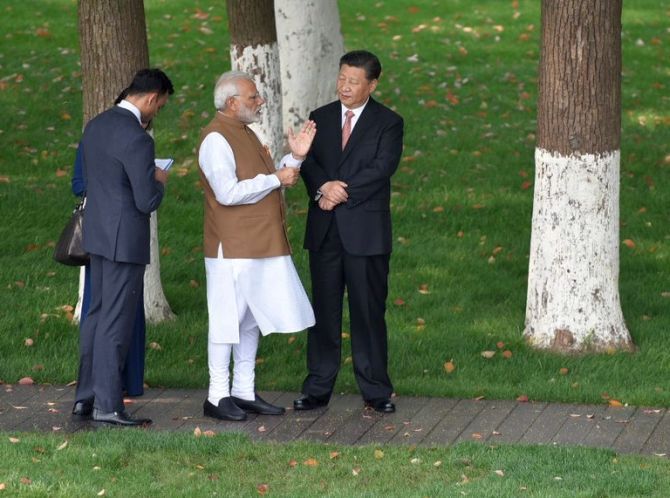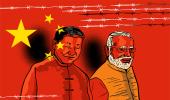'The meeting marks the first tentative step in the effort to understand whether the two largest Asian nations can co-exist peacefully while realising their aspirations.'
'Caution and watchful wariness will dominate the effort of both sides,' says Jayadeva Ranade, former RA&W officer and China expert.

IMAGE: Prime Minister Narendra D Modi with China's Supreme Leader Xi Jinping in Wuhan, April 28, 2018.
In a welcome but high risk bid to try and cool temperatures in India-China relations, Prime Minister Narendra D Modi travelled 3,583 kms to Wuhan, capital of China's Hubei province, for an 'informal' bilateral meeting with Chinese President Xi Jinping.
While the leaders met without the constraints of an agenda or pressure of issuing a joint statement, Chinese officials nonetheless sought to imply special importance to their meeting, spread over eight hours on April 27 and 28, by describing it as Xi Jinping's 'first informal meeting in China'.
Feelers for the meeting were first received after Modi and Xi met in Xiamen in September 2017. The visit materialised in the midst of severe strain on the bilateral relationship and when it has been on a downward spiral.
A primary objective was to try and restore bilateral ties to a more even keel.
The absence of an agenda and the 'informal' unscripted nature of the talks would have allowed a freewheeling and frank exchange of views on a range of contentious issues that bedevil India-China relations.
Nevertheless, both sides have been guardedly cautious in their respective statements which, for the most part, sidestepped specifics though while emphasising the importance of continuing strategic communications.
Major differences clearly remain.
As anticipated, India did not endorse China's 'Belt and Road Initiative' or the China Pakistan Economic Corridor.
There were other notable differences too, like the reference in the statements posted by the Chinese ministry of foreign affairs and the Chinese embassy in New Delhi to 'the fine norms enshrined in the Five Principles of Peaceful Co-existence', which was absent in India's statement.
The Chinese statement spoke of 'respecting each other's concerns and aspirations' while the Indian statement included 'sensitivities'.
The Indian statement expressed 'support for the work of the Special Representatives on the India China Boundary Question and urged them to intensify their efforts to seek a fair, reasonable and mutually acceptable settlement'.
The Chinese statement avoided injecting any sense of urgency and merely mentioned using 'the Special Representatives' Meeting on the Boundary Question to seek a fair, reasonable and mutually acceptable settlement'.
There was also no reference to any 'strategic guidance' being issued to the 'respective militaries to strengthen communication' as mentioned in the Indian statement.
The Chinese statement merely said 'The two militaries will strengthen confidence-building measures and enhance communication and cooperation to uphold border peace and tranquillity.'
The reference quite obviously is to the intrusions across the Line of Actual Control, but the Chinese statement makes implicit that the People's Liberation Army is firmly in the grip of the political leadership.
The 73-day 'face-off' at Doklam appears to have loomed large in the background.
The references can, however, be expected to see resumption, and possibly increase in the number, of the 'hand-in-hand' exercises held periodically between the two armies and enhanced contacts between military commanders.
The mention by Indian officials that the 'hot-line' between the two militaries, agreed to years ago, would now be operationalised is a positive step forward.
This will identify a 'responsible' point of contact in China's Central Military Commission to help prevent tensions escalating as during the intrusion by PLA troops in Chumar in September 2014 and earlier in the Depsang Plains in April 2013.
An important factor prompting China to recalibrate its policy towards India is the changing international situation.
For the past few months influential Chinese strategists and international relations experts close to Xi Jinping have warned that the international environment is becoming adverse and China is rapidly losing goodwill and the few friends it has.
They recommended that Beijing temporarily recalibrate its foreign policy to ensure it realises its ambitions.
They have pointed to the growing turbulence in US-China relations, increasing difficulties for the Belt and Road Initiative and India's increasing confidence and potential to derail China's ambitions.
Undoubtedly, the personalities of the two leaders provided an important texture to the meeting.
Prime Minister Modi has a powerful popular mandate and demonstrated political acumen. He has articulated a long-term vision for India.
In China, Xi Jinping has since November 2012 proved he is willing to take risks to advance his agenda. He has been ruthless in establishing control over the PLA and Chinese Communist party and his position in China today rivals those of Mao Zedong and Deng Xiaoping. He has spelt out a time table for restoring China to what he perceives is its old glory by 2050.
Economic growth is, pertinently, important for realising the ambitions of both leaders.
The meeting marks the first tentative step in the effort to understand whether the two largest Asian nations can co-exist peacefully while realising their aspirations.
Indicating that caution and watchful wariness will dominate the effort of both sides, relevant is the article of April 28 in the Global Times which asserts areas where China is unwilling to adjust.
Jayadeva Ranade -- former Additional Secretary in the Cabinet Secretariat, Government of India -- is presently President, Centre for China Analysis and Strategy.










